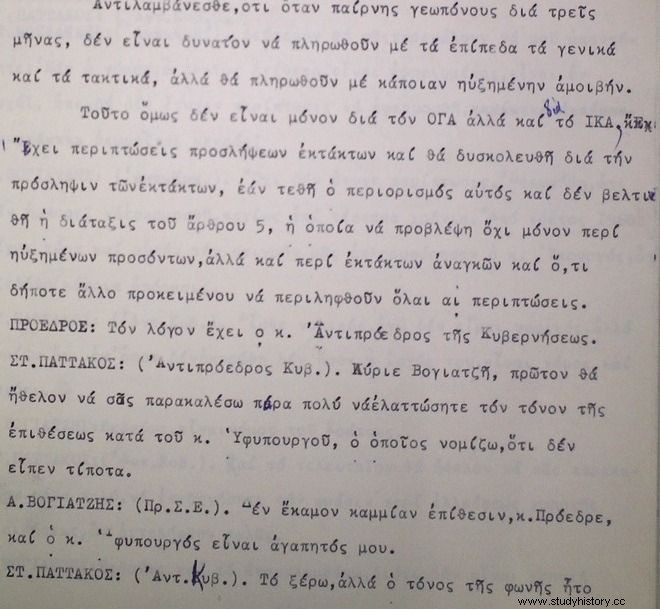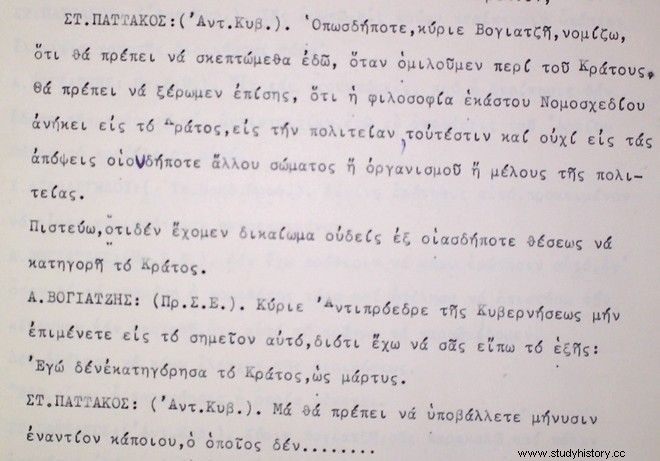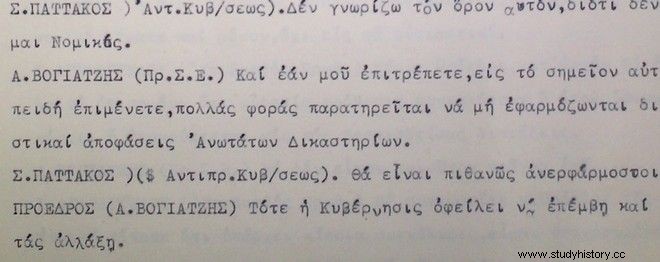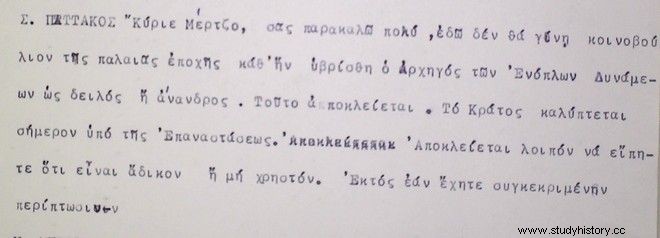In the year 2020, there is, at least for most, no doubt about how cowardly but at the same time dangerous the Junta of the Colonels (1967-1974) proved to be for the country.
However, the research done by News24/7 in the records of the minutes of the "Legislative Advisory Committee" in the library of Parliament reveals that in a single daily "parliamentary" debate on a routine issue can fit all the crisis of grandeur that possessed dictators. In this case, we are dealing with Stylianos Pattakos, Deputy Prime Minister.
But let's take things from the beginning. In the context of the "liberalization" of the regime, the dictator George Papadopoulos announced on April 10, 1970 (just before the Junta blew out the third candle of its sad birthday) the establishment of the Advisory Committee.
It was assumed that this body would replace the Parliament and produce legislation. In reality it was nothing more than a "parliamentary" fig leaf of the regime since its members were, indirectly or directly, controlled by the junta (those members not directly appointed by the government of the "revolution" were elected by labor and other organizations controlled by the colonels).
The time of the Brigadier General
The meeting that we will see here took place on Wednesday, March 8, 1972 and had as its main topic of discussion the "Legislative Decree on the regulation of the remuneration and working conditions of the private law of the State personnel".
At the meeting, in addition to the members of the Commission, six government ministers were also present, led by the vice-president (and Brigadier General) Stylianos Pattakos. The meeting in question would never have been remembered if Pattakos had not taken a phrase from the body's president, jurist Apostolos Vogiatzis, who spoke of "improper administration" on the part of the state.
It is a fact that the vice-president of the "Revolution" had no legal idea, but this did not prevent him not only from developing his absolute point of view but also from making a demonstration of his usual authoritarianism (fortunately only verbal here) apparently in order to reminded those present that despite the "liberalization" the regime remained absolutist, faithful to the principle of "we decide and order".
After a long discussion on individual articles of the decree, which mainly concerned the salary inequalities of public servants at the time (and this is important because bribery was second nature for the Junta), Pattakos asked to speak.
As the deputy prime minister, he was essentially Papadopoulos's ear and eye at the meeting for this reason and wanted to further investigate the "improper administration" he mentioned in Vogiatzis' speech.
But instead of acting unitedly (given that the spirits between Vogiatzis and the Deputy Minister of National Economy on employment matters G. Carter had soured) the Brigadier General wanted to make a leadership appearance:"Mr. Vogiatzis, first I would like to beg you very to reduce the tone of the attack against Mr. Deputy Minister who, I think, did not say anything" underlined.

After Vogiatzis remarked that he did not make any attack, Pattakos came back saying that "I know that but the tone of the voice was such that it seems here that you are attacking the Deputy Minister". In short, the Deputy Prime Minister wanted to define the style of each speech according to his own tastes.
Very soon, the dictator got to the point, to what really bothered him in Vogiatzis' speech:"I would very much like to beg you to explain the phrase about the lack of good administration, if they were well understood" ordered with tact.
"Prohibited"
A long dialogue followed in which Vogiatzis tried to convince Pattakos that the comment was not of a personal nature and that throughout the ages such phenomena were presented in all governments. The obvious, that is.
But the Brigadier General could not understand. And this was more evident from the following statement, when the discussion entered more "special" topics:"The philosophy of each bill belongs to the state, to the state in fact, and not to the views of any other body or organization or member of it state. I believe that no one from any position has the right to accuse the state:" In a few words, the separation of powers and democracy in general went for a walk. But what kind of democracy are we talking about...

After taking the lead, Pattakos didn't stop there. In any case, those who met him have to say about his overflowing character. He called Vogiatzis several times to calm down because "you are irritated" and reminded him once more, not so politely now, that "you are not allowed to attack the Minister. This case, as you say, is an attack on the State ". He interpreted every criticism this way or that way. As an attack on (his) state.
Vogiatzis understood that he had exceeded the narrow limits set by Pattakos. He started babbling about "misunderstanding" but in spite of all that, he did not actually back down on what he advocated for the differences in the salaries of civil servants. The dictator wanted to close the issue, Vogiatzis expressed his regret "if I upset you because you are not aware of the issue" and the Brigadier General replied that "we do not accept the condition that we are not a good administration. Because we did not understand it, we do not see such a thing".
However, Pattakos' great ignorance of democracy and how it works was shown in the two men's next poem. Vogiatzis, as if he wanted to play with Pattakos' nerves, said:"And allow me, at this point, because you insist, it is often observed that judicial decisions of the Supreme Courts are not implemented ." Pattakos' response:"They will probably be unenforceable!" . Comments are unnecessary.

Pattakos then preferred silence. Among those who took the floor, meanwhile, was Nikos Mertzos (journalist, author, former president of the Society of Macedonian Studies). His name was heard three years ago, in 2017, when the reaction of the Association of Imprisoned Exiled Resistance Fighters prevented him from being decorated by the President of the Republic, Prokopis Pavlopoulos.
In one of Mertzou's statements ("Mr. President, the state as a whole was not accused of not exercising good administration" ) Pattakos wanted to make it clear to everyone exactly what role the Advisory Committee had. So he replied that " Mr. Merzo, I beg you very much, here will not be a parliament of the old era when the Chief of the Armed Forces was insulted as a coward or a coward. This is impossible. The state is currently covered by the Revolution. It is impossible so say that it is unfair or useless. Unless you have a specific case" . In other words, you have no right to criticize.

Somewhere in there, any desire for more "resistance" ran out. And so that there would obviously be no other misunderstanding, acting president I. Xidopoulos hastened to emphasize that "when I excluded the criticism, I consciously excluded it because the body's role is advisory and there is no doubt about that" .
The discussion essentially ended with an "apology" by Xidopoulos to Pattakos:"We are not, Mr. Vice-President of the government, the successors of the previous body because we have a completely different role. Therefore, this comparison is also not possible". And somewhere there, democracy fell dead on the floor of parliament...
